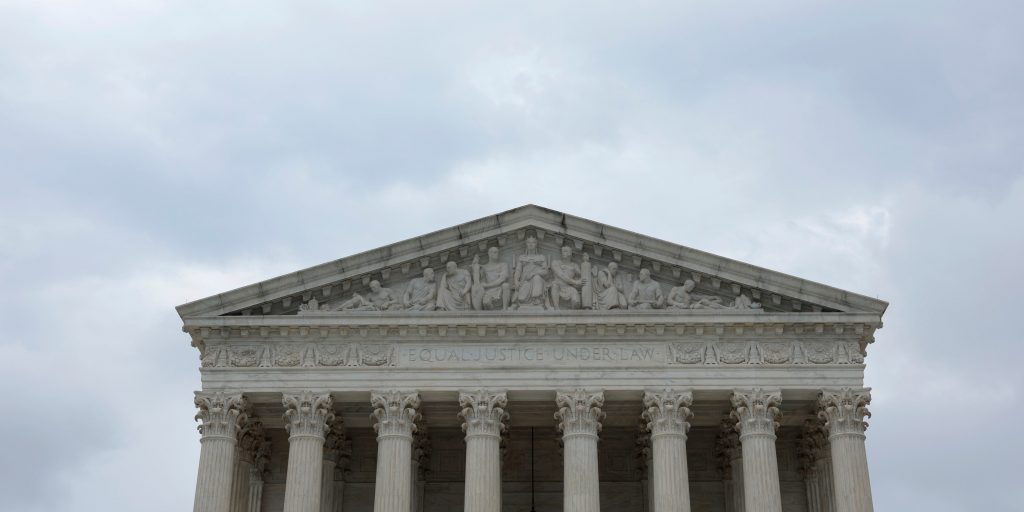- The Supreme Court delivered a major victory to religious-freedom advocates.
- The Court said a Maine rule that prohibits use of taxpayer money for religious teaching is unconstitutional.
- The ruling narrows the separation between church and state, according to some legal experts.
The Supreme Court on Tuesday ruled that a Maine program that bars taxpayer funds from being spent on religious teaching at schools is unconstitutional, delivering another major victory to religious-freedom advocates.
The decision was 6-3, with the court's conservatives in the majority.
"Maine's 'nonsectarian' requirement for its otherwise generally available tuition assistance payments violates the Free Exercise Clause of the First Amendment," Chief Justice John Roberts wrote in the opinion.
The case involved two Maine families who wanted to enroll their children at a private Christian school that offers religious teaching, but were denied tuition assistance from the state. Maine, a largely rural state that does not have public schools in some areas, has a program that allows public funds to cover students' tuition fees at nearby private schools, so long as they are "nonsectarian."
The families appealed the state's decision, arguing that the rule is discriminatory and violates their First Amendment right to exercise religion freely, otherwise known as the free exercise clause. A lower court dismissed their challenge, which was then brought to the nation's highest court.
"The court's already made pretty clear the rules here," Nicole Garnett, a professor at the University of Notre Dame Law School who filed a legal brief in support of the plaintiffs, told Insider ahead of the decision. "It's saying, if you don't want to enlist private schools to help educate your kids, you don't have to do. But if you do, you can't kick them out of the program or prohibit them because they're religious."
The Supreme Court's three liberals, Justices Stephen Breyer, Sonia Sotomayor, and Elena Kagan, dissented on Tuesday.
"This Court continues to dismantle the wall of separation between church and state that the Framers fought to build," Sotomayor wrote in a dissenting opinion.
The case largely represented a contest between the First Amendment's free exercise and establishment clauses, the latter of which prohibits the government from establishing or promoting religion. Maine argued that the state should not be forced to use taxpayer funds toward religious schools.
The Supreme Court's ruling has broad legal and political implications, experts say, and could bolster the school-choice movement driven, in part, by the religious right. Advocates of school choice say it offers students more options beyond the traditional public school system. Critics, meanwhile, say the school-choice movement erodes the public school system, which most students in the country attend.
"The biggest impediments to the expansion of school choice, legally in the United States, are state constitutional provisions that, on their face, require discrimination against religious institutions," Garnett said, referring to the Blaine Amendments, which the Supreme Court has largely said violates religious rights.
The Supreme Court's decision narrows the separation of church and state by potentially clearing the way for more taxpayer money to go toward religious teaching, some legal experts contend. And those teachings, for example, could include discrimination against the LGBTQ+ community.
"It's a choice context. So parents can choose to participate or choose to send their kids to a school that has some discriminatory provisions," Kevin Welner, a professor at the University of Colorado Boulder's School of Education, told Insider before the ruling.
Welner said the court's decision could spark new legal challenges from religious groups seeking taxpayer funding for religious education.
Consider that "I'm a religious entity. I have beliefs that involve what you call discrimination against members of the gay community," Welner said. "And I require you, the state, to not just issue a charter to me, but allow me to run this charter school as a private religious school that can discriminate."
The decision adds to a series of recent Supreme Court rulings that have protected religious liberties. Two years ago for a similar case, the court's conservative majority ruled that a Montana program that allowed taxpayer money to go to religious education was constitutional.
"Where justices in the past have looked to maintain this distance between religious beliefs and government support," Welner said, "The current court wants to make sure that all government support that can go to non-religious entities will also be freely available to religious entities and religious people."

